Oregon Scientific WMR 968 Handleiding
Oregon Scientific
Weerstation
WMR 968
Bekijk gratis de handleiding van Oregon Scientific WMR 968 (26 pagina’s), behorend tot de categorie Weerstation. Deze gids werd als nuttig beoordeeld door 44 mensen en kreeg gemiddeld 4.7 sterren uit 22.5 reviews. Heb je een vraag over Oregon Scientific WMR 968 of wil je andere gebruikers van dit product iets vragen? Stel een vraag
Pagina 1/26

EN
1
CABLE FREETM
WEATHER STATION
MODEL: WMR968
User Manual
SECTION 1 INTRODUCTION
Congratulations on purchasing the WMR968 Cable FreeTM
Weather Station. An all-purpose easy-to-use system, the
WMR968 lets you monitor the following weather elements:
-Air temperature
-Relative humidity
-Barometric pressure
-Wind speed and direction
-Rainfall
The WMR968 is also equipped with:
-Calendar clock with daily alarm
-Weather forecast within 20- to 30-mile (32 to 48 km)
radius
-Weather alarms
-Memory for maximum and minimum readings
-Simple, touch-screen operation
-RS232 PC connection jack
-™ backlight
STANDARD PACKAGE
The original WMR968 comes complete with the
following:
-Main unit (WMR968)
-Anemometer (WGR968)
-Thermo-hygrometer (THGR968)
-Rain gauge (RGR968)
-Baro-thermo-hygrometer (BTHR968)
-12V AC adapter
The thermo-hygrometer and rain gauge are powered by
solar transmitters STR928N while the anemometer is
powered by solar transmitter STR938.
The WMR968 can support up to seven different remote
instruments. You can also connect up to three optional
thermo or thermo-hygro sensors to the system.
Optional items include:
-Thermo-hygro sensor (THGR238)
-Thermo sensor (THR238)
Contact an authorized dealer for optional items.
SECTION 2 INSTALLATION
The WMR968 operates at 433MHz. No wire installation is
required among units.
The WMR968 has an effective range of 328 ft (100 m) in
an open area. Position the units within range and be sure
the transmission path is clear of interference and obstacles.
NOTE The anemometer, thermo-hygrometer and rain
gauge should be installed outdoors and in locations that
best measure the weather elements the instruments are
designed for. As for the baro-thermo-hygrometer, it must
be installed indoors. If you have any optional thermo or
thermo-hygro sensors, they can be installed outdoors or
indoors.
THE ANEMOMETER
The anemometer measures wind speed and direction.
To install it,
1. Place the wind cup over the thinnest shaft on the
anemometer’s T-bar.
2. Tighten the screw on the base of the wind cup.

2
EN
3. Align the red markings on the wind vane’s shaft.
4. With the aid of a compass, face the red marking south
before mounting the anemometer.
5. Mount the anemometer and its solar transmitter safely
in place.
The wind speed and direction window on the main unit
should read 180˚ if the main unit is installed.
THE THERMO-HYGROMETER
The thermo-hygrometer measures outdoor temperature
and humidity.
To install it:
Mount the thermo-hygrometer and its solar transmitter
safely in place.
THE RAIN GAUGE
The rain gauge measures the total amount and rate of rainfall.
To install it:
1. Open the cover of the rain collector.
2.
Remove the fiber tape from around the bucket assemblies.
3.
Mount the rain gauge and its solar transmitter safely in place.
4. Put drops of water on the cross at the base on the rain
collector to check the leveling.
5. Use metal ring to adjust the leveling of the rain collector
if necessary.
6. Close the cover of the rain collector.
THE SOLAR TRANSMITTERS
The solar transmitters make use of solar energy to power
the instruments they are connected to.
NOTE
It is recommended to insert two UM3 or “AA”-sized
super lithium batteries for weather condition under 0 ˚C (32 ˚F).
Standard Alkaline batteries contain significant amounts of
water. Because of this they will freeze in low temperatures
of approximately 10˚F (-12˚C). Disposable Lithium batteries
have a much lower threshold for temperature with an
estimated freezing range of below -40˚F (-40˚C). The
Liquid Crystal Display in outdoor thermometers will remain
operational to -20˚F (-28˚C) with adequate power.
Wireless ranges can be impacted by a variety of factors such
as extremely cold temperatures. Extreme cold may temporarily
reduce the effective range between the sensor and the base
station. If the unit's performance fails due to low temperature,
the unit will resume proper functioning as the temperature
rises to within the normal temperature range (i.e no permanent
damage will occur to the unit due to low temperatures).
For the solar transmitters to function properly, make sure
the solar receptors on the transmitters are exposed to
sunlight and the connectors of the connection cable are
securely plugged in.
THE BARO-THERMO-HYGROMETER
The baro-thermo-hygrometer measures the atmospheric
pressure, temperature and humidity.
The sensor uses four UM4 or “AAA”-sized batteries.
To install it,
1. Insert alkaline batteries accordingly.
Water staying
at position 1 - 4
means the gauge
is not leveled
METAL RING

EN
3
2. Mount the unit where you want to monitor the readings.
Or you can make use of its table stand to place it on a
flat surface.
THE MAIN UNIT
The main unit gives you all the readings and controls. It
should be placed indoors.
The main unit is powered up by the 12V AC adapter.
To install it,
1. Position the main unit and other units within effective
range 328 ft (100 m).
2. Insert four UM3 or “AA”-sized alkaline batteries for
backup purposes.
3. Mount the main unit safely in place. Or use its table
stand to place it on a flat surface.
4. Connect the AC power adapter to the main unit and a
wall socket.
5.
Press the [RESET] button on the main unit to initiate
operation.
The main unit will start searching for signals for about four
minutes. Upon successful reception, the readings will be
displayed. The main unit will update the readings at regular
intervals.
NOTE If the main unit is operating solely on battery power,
the EL backlight and RS232 connection will be disabled.
LOW-BATTERY WARNING
There are low-battery indicators [ ] for the main unit, rain
gauge, baro-thermo-hygrometer, thermo-hygrometer and
optional remote thermo and thermo-hygro sensors. Replace
the batteries when the respective indicators light up.
NOTE
T
he readings collected from the thermo-hygrometer
and any optional remote thermo and thermo-hygro sensors
share the same display window. The “OUT” and remote
channel will share the same low-battery indicator. When
the battery level of the thermo-hygrometer is low, the low-
battery indicator will turn on. If it is one of the optional
remote sensors, the low-battery indicator will blink. To
locate the channel in question, press the window to scan
through all available devices. The low-battery indicator will
stop blinking if the battery level is low for that one.
SECTION 3 OPERATION
THE MAIN UNIT
A. WEATHER FORECAST AND BAROMETRIC
READING WINDOW
B. INDOOR TEMPERATURE WINDOW
C. INDOOR HUMIDITY WINDOW
D. OUTDOOR/CHANNEL TEMPERATURE WINDOW
E. OUTDOOR/CHANNEL HUMIDITY WINDOW
F. RAINFALL WINDOW
G. CALENDAR CLOCK AND DAILY ALARM WINDOW
H. WIND SPEED AND DIRECTION WINDOW
I. CHANNEL BUTTON
J. MEMORY BUTTON
K. ALARM BUTTON
L. SET BUTTON
M. UNIT BUTTON
N. ALARM ON/OFF BUTTON
O. [] BUTTON
P. [] BUTTON
Q. [ RESET] BUTTON
R. RS232 SERIAL PORT
S. DC 12V JACK
Product specificaties
| Merk: | Oregon Scientific |
| Categorie: | Weerstation |
| Model: | WMR 968 |
Heb je hulp nodig?
Als je hulp nodig hebt met Oregon Scientific WMR 968 stel dan hieronder een vraag en andere gebruikers zullen je antwoorden
Handleiding Weerstation Oregon Scientific

14 December 2024
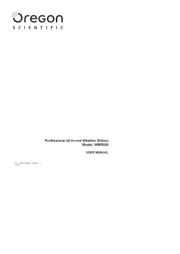
14 December 2024
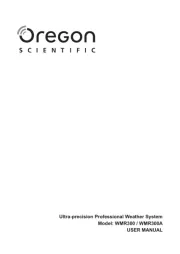
14 December 2024

14 November 2024

14 November 2024

14 November 2024
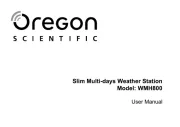
14 November 2024

14 November 2024

14 November 2024
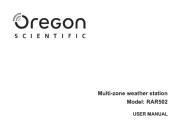
14 November 2024
Handleiding Weerstation
- EMOS SELECT
- Vitek
- Thomson
- Weinberger
- Optex
- ECG
- Profile
- Beurer
- Soehnle
- Gira
- Technisat
- Edenwood
- Browin
- Theben
- Muse
Nieuwste handleidingen voor Weerstation
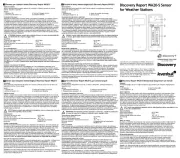
10 September 2025
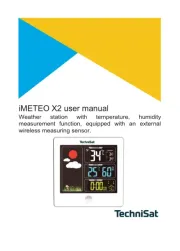
3 September 2025
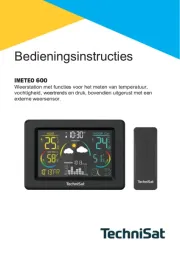
3 September 2025
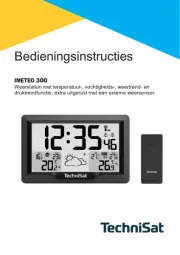
3 September 2025
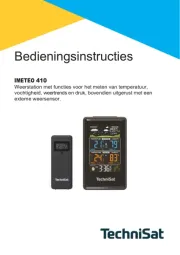
3 September 2025
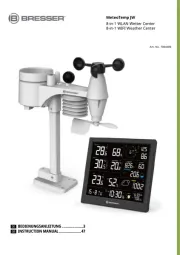
14 Augustus 2025

14 Augustus 2025

9 Augustus 2025
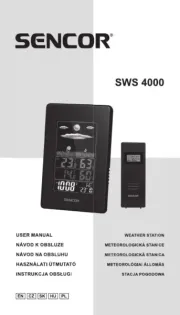
8 Augustus 2025
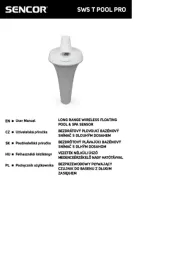
8 Augustus 2025